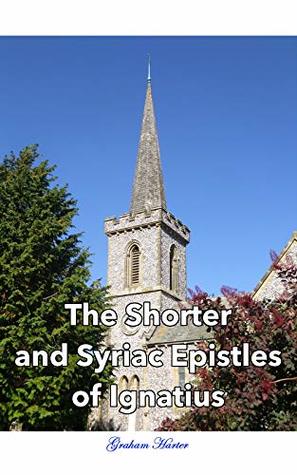- Bíblia
- Leia a Bíblia
- Versões da Bíblia
- Verso do dia
- Planos de Leitura
- Versos por Tópico
- Books of the Bible
- Imagens bíblicas
- Estude
- Comentários
- Concordâncias
- Dicionários
- Enciclopédias
- Sermões
- Bible Atlas & Maps
- BP Wiki
- Devocionais
- Devocionais de hoje
- Light of the World
- Todos os devocionais
- Inspirational Quotes
- Mais
- Picture Quotes
- Videos
- Inspirador
- Estudo da Bíblia
- O que a Bíblia diz
- Bible Q&As
- Daily Bread
- Bible by Genre
- Bible Stories
- Random Bible Verse
- Comunidade
- Store
The Shorter and Syriac Epistles of Ignatius (Early Christian Writings Book 2)
by Ignatius of Antioch
This volume presents a modernized text of the seven surviving letters of one of our earliest Christian writers, Ignatius of Antioch, who was martyred around A.D. 107, and who is believed to have known the Apostle John personally. The seven letters presented here were all written whilst Ignatius was on his way, under arrest by the Roman authorities, to Rome to be devoured by wild beasts in the arena. As such, they are imbued with a pathos which is rarely matched elsewhere, as Ignatius strived to ensure the fledgling Christian Church continued to believe in a Messiah who was both truly God and truly man.
Included in this volume are the Shorter Greek form of Ignatius’ letters, along with the Syriac versions of three of them published by Dr. Cureton of the British Museum in 1845. There is a Longer Greek form of these letters, but they appear to be an inauthentic production of a later age. They are therefore not included in this edition.
The translation presented here is a revised and modernized re-wording of the translation of these epistles found in Alexander Roberts, D.D., James Donaldson, LL.D., and A. Cleveland Coxe, D.D. (eds.), ‘The Ante-Nicene Fathers, Volume I: The Apostolic Fathers, Justin Martyr, Irenaeus’ (T&T Clark, Edinburgh, and Wm. B. Eerdmans, Grand Rapids, Michigan, reprinted 1996).
Included in this volume are the Shorter Greek form of Ignatius’ letters, along with the Syriac versions of three of them published by Dr. Cureton of the British Museum in 1845. There is a Longer Greek form of these letters, but they appear to be an inauthentic production of a later age. They are therefore not included in this edition.
The translation presented here is a revised and modernized re-wording of the translation of these epistles found in Alexander Roberts, D.D., James Donaldson, LL.D., and A. Cleveland Coxe, D.D. (eds.), ‘The Ante-Nicene Fathers, Volume I: The Apostolic Fathers, Justin Martyr, Irenaeus’ (T&T Clark, Edinburgh, and Wm. B. Eerdmans, Grand Rapids, Michigan, reprinted 1996).
BUY NOW
Kindle Edition, 157 pages
Published October 31st 2018
Se inscrever
© 2025 Bibleportal.com Todos os direitos reservados.

St. Ignatius of Antioch (35 -117)
(Ancient Greek: Ἰγνάτιος Ἀντιοχείας, Ignátios Antiokheías; ad c. 35 or 50 – 98 to 117), also known as Ignatius Theophorus (Ιγνάτιος ὁ Θεοφόρος, Ignátios ho Theophóros, lit. "the God-bearing"), was a student of John the Apostle, was the third bishop of Antioch, and is now counted among the Apostolic Fathers of the Christian Church.[En route to Rome, where according to Christian tradition he met his martyrdom by being fed to wild beasts, he wrote a series of letters which have been preserved as an example of very early Christian theology. Important topics addressed in these letters include ecclesiology, the sacraments, and the role of bishops. Ignatius modeled his writings after Paul, Peter, and John, and even quoted or paraphrased their own works freely, such as when he quoted 1 Cor 1:18, in his letter to the Ephesians.
... Show more